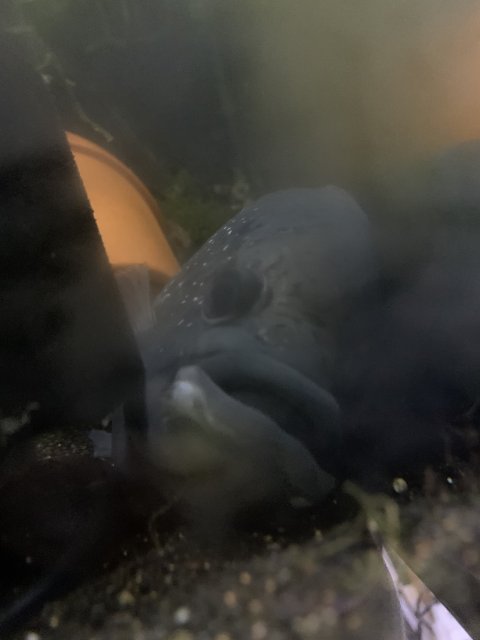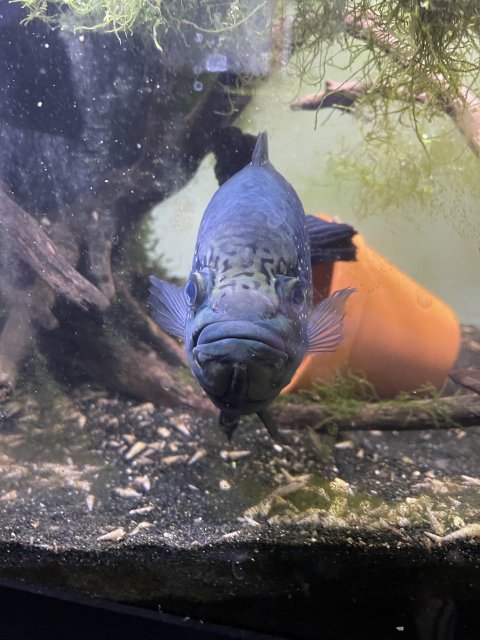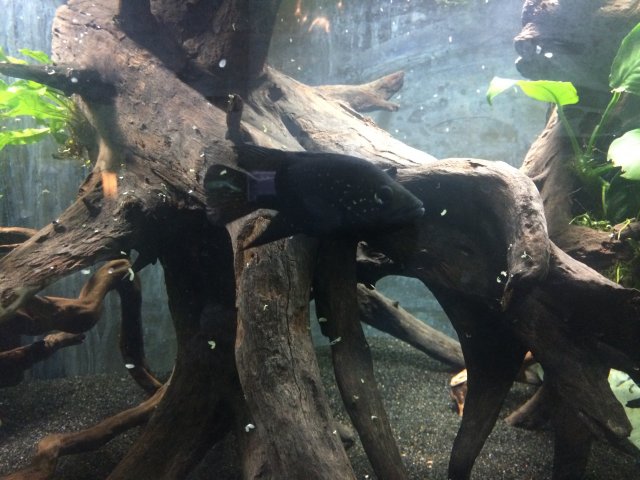Hello,
I have a P. polleni that has been inactive and not eating for the past several days. His lips have been a bit white, but I chalked this up to him digging. Today I noticed they are quite swollen.
He is about 3 years old, living alone in a 65 gallon. Nitrate is <5ppm right now and the last WC was this past Thursday. Normally the temp is 81F.
Some research leads me to believe this may be duck lips/columnaris. I have lowered the temperature to 75F for now, and dosed kanaplex. I know this is not the best medication for this job, but as I am Canadian my options for medications are extremely limited thanks to a brain-dead government. The only other thing I have is some Neoplex from many, many years ago which I have not used.
He has eaten a bit in the past couple days, but I have toned the feedings down as he wasn't expressing much interest. He is now primarily lying down in the back of the tank behind the sponge filter. When attempting to get him to move so I could inspect him he does swim upright and as if he was fine, but I know this not to be the case as his is typically a very aggressive eater and confident fish. Will follow you around the room, blast food once it hits the surface, etc.
I noticed he did have a scrape on his side two days ago which is healing well, so I have some hope that his immune system isn't fully compromised.
I have attached a photo and a gif. These are not the best, but I do not want to rustle him too much and add extra stress. I would greatly appreciate any advice. I have read many forum posts so far and I know some people advise euthanasia, but as he is the only fish in this aquarium and my favourite I refuse to do this unless he is clearly unable to make it. A photo of this fish is up in my living room, so I would hate to lose him.


I have a P. polleni that has been inactive and not eating for the past several days. His lips have been a bit white, but I chalked this up to him digging. Today I noticed they are quite swollen.
He is about 3 years old, living alone in a 65 gallon. Nitrate is <5ppm right now and the last WC was this past Thursday. Normally the temp is 81F.
Some research leads me to believe this may be duck lips/columnaris. I have lowered the temperature to 75F for now, and dosed kanaplex. I know this is not the best medication for this job, but as I am Canadian my options for medications are extremely limited thanks to a brain-dead government. The only other thing I have is some Neoplex from many, many years ago which I have not used.
He has eaten a bit in the past couple days, but I have toned the feedings down as he wasn't expressing much interest. He is now primarily lying down in the back of the tank behind the sponge filter. When attempting to get him to move so I could inspect him he does swim upright and as if he was fine, but I know this not to be the case as his is typically a very aggressive eater and confident fish. Will follow you around the room, blast food once it hits the surface, etc.
I noticed he did have a scrape on his side two days ago which is healing well, so I have some hope that his immune system isn't fully compromised.
I have attached a photo and a gif. These are not the best, but I do not want to rustle him too much and add extra stress. I would greatly appreciate any advice. I have read many forum posts so far and I know some people advise euthanasia, but as he is the only fish in this aquarium and my favourite I refuse to do this unless he is clearly unable to make it. A photo of this fish is up in my living room, so I would hate to lose him.















